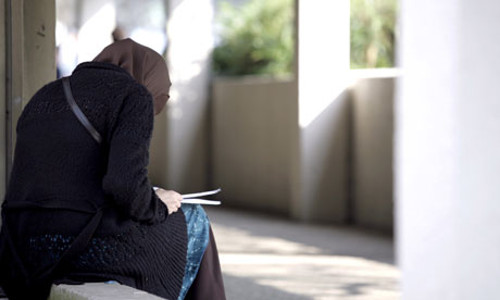
By: RASHEED ABOU-ALSAMH
Source: Arab News
On Sunday, March 15, a Brazilian Muslim law student, Charlyane Souza, 29, went to take the Brazilian bar exam of the Organization of Brazilian Lawyers (OAB in the Portuguese acronym) in Sao Paulo and was interrupted and questioned several times because she was wearing hijab.
According to the Organization of Brazilian Lawers rules, anyone taking the exam is not allowed to wear any sort of hat or head covering that covers the ears. This is because they fear cheating students will use Bluetooth earpieces to communicate with someone on the outside who will help them with the answers.
According to Charlyane, she was frisked when she arrived at the testing hall and allowed to enter and begin taking the exam. Within minutes though, she said she was approached by a female official who asked her to come with her to a room for questioning. There the woman asked her why she had her head covered, and Charlyane replied it was because she was Muslim, and had to hide her hair from the gaze of unrelated men. The official did not believe her. “She asked me if I really was Muslim, and if I had a way of proving it, because I could be just disguising myself as one,” an exasperated Charlyane told local reporters.
She returned to the examination hall after this initial questioning, but was soon interrupted again by Rubens Tilkian, the president of the OAB’s examination commission, who had been summoned to deal with the situation. He asked her if she would feel uncomfortable taking her hijab off, as other exam takers were allegedly feeling “uncomfortable.” Charlyane replied that her hijab was not an accessory that could just be taken off on a whim, so she was taken to a private room to finish taking the exam. According to her, these two interruptions, and the changing of rooms took a whole hour away from her total exam time. In the end she failed the exam after only getting 31 questions right out of a total of 80. To pass the first phase of the exam, one must get at least 40 questions right.
The OAB released a statement after all of this saying they were looking into changing their rules to allow Muslim women to wear their hijab while taking the exam, but they did not apologize for their insensitive and gross treatment of Charlyane. Which is a shame really, considering that there at least 1.5 million Muslims living in Brazil according to the Brazilian Islamic Federation, and women wearing the Islamic hijab should not be a surprising or unusual thing in this day and age. Unfortunately, there is much anti-Muslim discrimination in Brazil that hides behind the enforcement of petty rules. Just a few years ago in the southern state of Paraná in the city of Foz de Iguaçu, which has an Arab population of 20,000, 90 percent of whom are Muslim; women were not being allowed to wear their hijab in photos used to renew their drivers’ licenses. This despite the fact that the federal Brazilian government allows Brazilian Muslim women to wear the hijab in their passport photographs and there being no law that prohibits women from wearing hijab while driving. A campaign to overturn this local law was started in Paraná and was successful in doing so. On July 10, 2013, the first day of Ramadan in Brazil, the governor of Paraná approved a new law that allows Muslim women to wear their hijab in photos for their driving licenses.
The image of Islam and Muslims in Brazil, just like in other parts of the world, has unfortunately suffered badly with the bloody and violent actions undertaken by terrorist groups in the Arab world in the name of our religion. All the more reason for us Muslims to be on guard and defend our image and rights. Local Muslim groups here in Brazil should have vocally denounced what happened to Charlyane. The OAB owes her an apology and the chance to re-sit the exam, with her hijab on. There is no reason for anyone to feel threatened or harassed by her hijab. That is just a smokescreen for people’s Islamophobia, which Sao Paulo state and Brazilian federal officials should vigorously denounce as unacceptable and beyond the pale.



